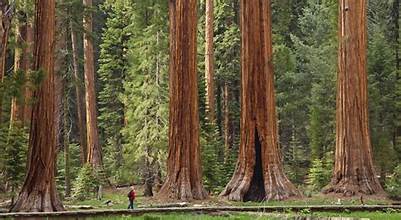Focal Passage: Colossians 2:2-7
While visiting California years ago, my wife and I visited the Sequoia National Park, walking among those magnificent redwoods towering toward the sky. After growing up among the mesquite trees on the South Plains of Texas, those trees inspired awe and reverence in God’s amazing creation.
The National Park Service believes the 275-foot tall President’s Tree in the park is among the oldest trees in the world, estimated to be more than 3,200 years old. That means when the President’s Tree sprouted as a seedling, Israel had no king, Samson fought his battles with the Philistines, and God was actively preparing the stage for Samuel, Saul and David.
You probably knew that sequoias don’t have a tap root. Their roots rarely go deeper than 10-12 feet, but they spread as far as 150 feet or more in every direction in search of water and nutrients, intertwining with the root systems of the trees growing around them. It is this interlocking root system that gives them strength, enabling them to stand strong through the centuries despite wind or storm.
Paul would have enjoyed knowing about these redwoods. It would have provided another great illustration to use as he wrote to the churches in Asia Minor.
No firm record exists that the apostle Paul ever personally visited Colossae. The apostle sent Epaphras, his recent convert and companion, to Colossae to preach and teach the gospel in what was likely Epaphras’ hometown.
By the time Paul sent his letter to believers in this once prominent city, the church was already being pressured by false teachers and even well-meaning individuals who misunderstood Paul’s teachings about Christ. Paul intended his letter as an encouragement for the believers in Colossae to stay grounded in the gospel they were taught. Hear his words.
My goal is that they may be encouraged in heart and united in love, so that they may have full riches of complete understanding, in order that they may know the mystery of God, namely Christ, in whom are hidden all the treasures of hidden wisdom and knowledge. I tell you this so no one may deceive you by fine sounding arguments. For though I am absent from you in body, I am present with you in spirit, and delight to see how disciplined you are and how firm your faith in Christ is. (Colossians 2:2-5)
It is what he wrote next that captured my attention.
So, then just as you received Christ Jesus as Lord, continue to walk in him, rooted and built up in him, strengthened in the faith as you were taught, and overflowing with thankfulness. (Colossians 2:6-7)
Paul gave the believers in Colossae a lot to think about in these two verses. Everything it implied to those first century believers applies equally to any 21st century believer in Christ.
Colossian believers received Jesus as Lord through faith alone, not by adding rituals, Greek philosophy or Jewish legalism to the good news they heard proclaimed. He urged them to continue in faith as they were taught when they first received Christ. He implored them to not muddy the waters with things that have no foundation in Christ Jesus.
Depending on the Bible translation you use, Paul told them to keep on “walking” or “living” in Christ every day. The Hebrew word halak, translated here as walk, stands as a metaphor for one’s daily life. In other words, Paul warned them not to add or subtract from their daily walk in Christ some philosophical or mystical experience taught by those trying to draw them away from the faith they first experienced in Jesus.
This idea of walking in Christ reminds us that the way we choose to live—every decision, every thing we do–should flow from our growing relationship with Jesus, rather than from outside influences or teachings of those wanting to adjust the gospel to make it more comfortable or appealing to the world. Let truth, but the truth, Paul might declare. While many in the world might consider the Christian walk limiting, Paul found it liberating.
Paul frequently talked about dying to self in some of his other letters…this idea of a believer in Christ setting aside life unbecoming and less fulfilling for the life to which we’ve been called in Christ. He just a few sentences later in Colossians 3:2-3, Paul wrote,
Set your minds on things above, not on earthly things. For you died (to your old life), and your life is now hidden (secured and protected) with Christ in God.
What the world offered compared poorly with what Paul felt he gained with Christ.
For whatever were gains to me I consider loss for the sake of Christ…I consider them garbage that I might gain Christ and be found in him, not having a righteousness of my own that comes from the law, but that which is through faith in Christ. (Philippians 3:7-9)
If Paul knew about those mighty redwoods in California, he might have drawn from that knowledge to clarify his next words.
Continue to walk in him, rooted and built up in him.
Think about this. In order to grow to its impressive size, a giant sequoia every day takes in about 800 gallons of water and a steady supply of nutrients primarily through its expansive root system. To be rooted is to be fed and nourished.
However, its strength comes from its connection with other trees, by interweaving its roots with the roots of other nearby sequoias. A sequoia could not survive in isolation. The interlocking system of roots prevent it from being toppled in a storm.
Being rooted in our faith carries two distinct meanings for me.
We are to be rooted in the gospel. Our spiritual nourishment comes only when we study God’s word and spend time with him in prayer, seeking his wisdom and understanding in how he wants us to act and react to life. Being soundly rooted in the teachings of Christ enables us to live fully nourished and strong in the face of every foul wind and storm life throws our way.
We need to realize our need for belonging to a community of faith. We can study and pray and never walk into a place of worship, but I don’t believe we will ever be as strong in our faith as we can be if we practice our faith in isolation.
When we try to live our faith without the presence of other believers in our lives, without the fellowship of the church, we risk losing our grip on faith’s foundation when the next big storm arrives. We need to intertwine our faith roots with the roots of our brothers and sisters in Christ.
Faith was never meant to be a solitary walk. Faith grows in the connection with other like-minded believers. This connection holds us up in our times of greatest need.
I know in my own life the church, my church, provides strength, stability and endurance when I need it most. If you’re not present in worship and Bible study on a regular basis you miss out on the strength gained from others who have walked the same road you’re walking, even those who managed to avoid it in the first place.
When we belong to a community of believers, we are not only more rooted in our faith, we’re “built up in him,” as Paul said. I learn a lot in my personal reading when I read and study scripture. God always teaches a new thought or reinforces my study when I listen to my pastor’s sermons. When I’m open to the spirit’s teaching and guidance while in corporate worship. When studying or discussing the Bible with fellow believers. When watching my spiritual heroes live out their faith walk with Christ in the face of life’s challenges and uncertainties.
Paul even affirmed that thought when he encouraged the Colossian church to be “strengthened in the faith as you were taught.” Being rooted and built up in Christ and his church gives me strength to endure. It sustains me in troubled times. It allows me to grow deeper in my faith and relationship with Christ. I thrive on my connection with Christ and those who believe so strongly in him.
This connection is something I pray I never lose and something I desire for my family. Aside to salvation itself, this connection would be the greatest blessing he gives anyone.
Let me encourage you. Since you received Christ as Lord by faith, keep living each day in his footsteps, modeling the things you do and say in the pattern of Christ. Let your roots continue to seek the spiritual nourishment that delving into his word always provides.
Connect yourself with a local congregation of believers. Find a place to worship where they will build and strengthen your faith. Actively join that fellowship of believers in praise, worship and Bible study. I promise it will make a difference in your life just as it has in mine.
Paul added one final word of advice to the church in Colossae at the end of our passage. He encouraged them to overflow with thankfulness. Not just to be thankful, but to overflow. Letting our gratitude to God spill over into our worship, our walk and our witness.
The call to overflow with thankfulness connects deeply with the foundational principles of discipleship and spiritual growth. When we are firmly established in our faith and in Christ, we more easily see his work in our lives—in our salvation, the guidance of his spirit, his daily provision. Gratitude naturally follows.
It is this gratitude that shapes our perspective in difficult times, reminding us that God is at work even in our suffering.
Rejoice always, pray continually and give thanks in all circumstances, for this is God’s will for you in all circumstances. (I Thessalonians 3:18)
As we let our gratitude overflow, make this be our prayer.
May our faith roots be as broad as the redwood, nourishing our souls and transforming us into the mirror image of Christ himself. Connect us more tightly to a community of believers to teach and strengthen us. Through it all, make us more like Jesus in a world that desperately needs to see his face in us.
Thinking Points
1. In what ways are your spiritual “roots” nourished daily, and where might you need to seek deeper connection with Christ through Scripture and prayer?
2. Paul emphasizes being “rooted and built up in Christ” while staying true to the gospel. In what areas of your life might outside influences be subtly reshaping your walk with Christ?
3. How does your relationship with other believers strengthen or challenge your faith, and are there ways you could cultivate more meaningful spiritual connections?
4. How often do you intentionally cultivate gratitude in your life, and how could a practice of “overflowing thankfulness” transform your perspective on daily struggles or blessings?


